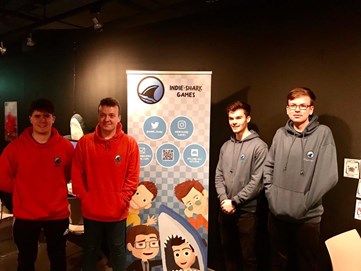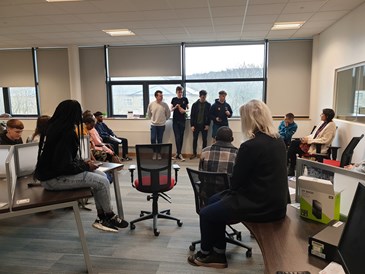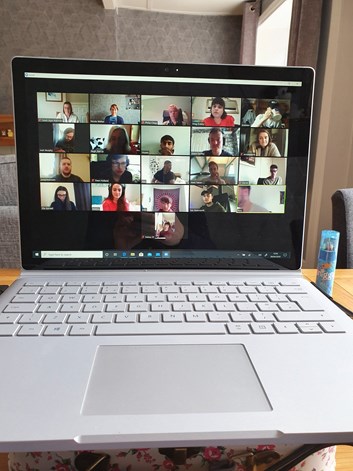Group Size
?
1.) Small group (teams of 4-6)
2.) Individual Task
3.) Large Group
4.) Any
Any
Learning Environment
?
1.) Lecture Theatre
2.) Presentation Space
3.) Carousel Tables (small working group)
4.) Any
5.) Outside
6.) Special
Any
QAA Enterprise Theme(s)
?
1.) Creativity and Innovation
2.) Opportunity recognition, creation and evaluation
3.) Decision making supported by critical analysis and judgement
4.) Implementation of ideas through leadership and management
5.) Reflection and Action
6.) Interpersonal Skills
7.) Communication and Strategy
5Reflection and Action
6Interpersonal Skills
7Communication and Strategy
Pitch club is designed to be a safe space to master pitching skills. This interactive workshop facilitates the creation and delivery of a 60 second elevator pitch - a brief, concise and bold narrative about you or your business. This is offered to all students as an extra curricula opportunity to hone their pitching skills with help from serial entrepreneur and Dragons Den participant; Sarah Agar-Brennan and the wider Enterprise Team at the University of Huddersfield.
An online or in person interactive workshop where learners are encouraged to prepare, work on and pitch a 60 second elevator pitch format. Each session builds on the last so the learner grows in confidence, develops their performance and learns to interact with other students.
The session begins with a brief introduction of what a pitch is, if it’s the first time delivering we show a brief presentation with videos (included in the attachments) to bring the concept to life. As an ice breaker we usually ask the learners to have prepared a 20 second introduction about themselves to include their name, reason for being there and then an interesting fact/hobby about themselves – if it’s a business environment we ask them to tell us about their idea.
As the sessions progress the format of the beginning tends to evolve as learners start to pitch their 60 second offering. To maximise on time, we roll straight into the pitches and feedback which comes in two forms:
Key teaching points are emphasised throughout each of the sessions we run. The principles remain the same so it’s just a matter of reinforcing them until the behaviour is learnt, they tend to be:
James Clear in his book Atomic Habits states that in order to see improvements one must take 1% action every day. The activity of pitch club builds on cementing the skill of pitching in a slow and steady way which drives results.
The session runs over 60 minutes with the time being divided as equally as possible with the number of learners that attend. We always have one of the team members timing the pitches and providing those times to the learners so they can expand or decrease content to hit that 60 second pitch. It’s very much down to the facilitator to consider the number of attendees and plan the session in the first few minutes limiting their feedback to the time they have.
My own reflections on pitch club are that it is a joy to deliver! Watching our learners come out of their shell and grow in confidence with each session is the reason I do my job, it’s like watching a flower blossom. When I came up with the idea for the club back in November 2019 I never thought for one moment the impact it would have on the lives of so many students.
I learnt to pitch in my 40’s having run businesses all my working life. I avoided learning the skill for years; I think looking back I was scared to put myself out there in this way and the concept of learning to pitch was too massive in my head. Fast forward to my role at the university and my desire to create a safe space to take learners through the steps of pitching so they feel supported and not overwhelmed.
As a team we have refined our delivery as we have gone along but the concept has stayed pretty much the same since the beginning. The biggest hurdle we have to over come is the learners desire to start the process, once they do they are hooked and can see and feel the benefits within a small number of sessions.
At the moment we deliver to our Enterprise Placement Year (EPY) students as they are tasked with creating a 5-minute pitch which they are assessed on at the end of their placement. The feedback from one of the judges in the first year of delivery was:
Damian Mullany, Santander UK Relationship Manager
The pitches are a really high quality, the best I have seen from Huddersfield and without using business idea / viability it was so hard to judge.
Kayleigh, PHD student
When I started my business, I knew I had something special and I was passionate about it, but I felt as though I couldn’t articulate it to others in a way that sounded professional and concise. I had a tendency to ramble and trip over my words and somehow my great idea became less impactful by the time it left my mouth. I was fortunate to be offered coaching with Sarah to teach me how to pitch and it has vastly improved the way that myself and my business are perceived by others. I can now confidently share what I do and why what I do is special. I’ve received great buy in from others and I can tell that the people I pitch to now feel the same excitement and passion for my business as I do. I have also carried these skills forward and have had the pleasure of expanding the reach of my business by talking on panels, delivering workshops and winning two consecutive enterprise challenge days - pitching successfully has been a key element in all of these. In the past I don’t think I could have estimated the power that pitching skills would have upon my professional development, but I can confidently say that they have been instrumental in my successes to date.
Here is some learner feedback from current and previous EPY students:
Shyam, previous EPY student
Pitch club was a safe space to communicate my business and a place I could receive constructive feedback. Pitch club ultimately helped to build my confidence and communication skills, which has led me to deliver excellent winning pitches for projects.
Mark, previous EPY student
Sarah's guidance in pitch club has given me the skills to explain my business in non-musician terms while also keeping the presentation interesting. It has also given me plenty of experience pitching which massively boosted my confidence not just for pitching, but job interviews, and public speaking as well.
Adam, current EPY student
Learning about pitching is a very different thing than most other academic things you can be taught, in university we're usually led towards the information so that we can research and understand it ourselves but pitching is a skill that has a lot more nuance and really requires both practice and a focus group to receive feedback to improve. Having Sarah and the other EPY staff on board every session is perfect for knowing exactly how to improve for next session so that I'm never left in the dark as to my progress on pitching - I appreciate the sessions a lot.
Mubashir, current EPY student
The pitching sessions I had with helped me a lot. I reached the semi-final of a national Varsity pitching competition organised by NACUE in partnership with TATA as a result. I have a confidence issue and I am aware of it, but these sessions helped me challenge myself. Now I am availing any opportunity to raise my profile as a designer and as a safety professional. I just recently told the story of my design journey in front of over 200 Biodesign alumni. I have also opted in to deliver a talk on height safety at an international exhibition. I still don’t have full confidence in my presentation skills, but I can feel that I am getting better at it.
Rozina, current EPY student
I've found that pitching has helped me improve my confidence as well as some of my public speaking skills.
Pitch club has been a success which has enabled us to use the format in various initiatives throughout the university such as the GPA, Kickstarter, on curriculum modules and the SU. We have tried to roll it out to a wider Enterprise Hub audience but the attendance has been very hit and miss which has led us to prioritise resources and offer it as part of other initiatives where they can guarantee the learners.
I have considered this at length and I feel that where the students don’t have a purpose to learn to pitch the desire to attend pitch club is diminished. This is shown in the data for current EPY students where we have over 65% voluntary attendance. It’s definitely something I would like to explore further and perhaps work across the university more.



A copy of the Pitching Top Tips handout we have created to help learners remember the key elements.
https://students.hud.ac.uk/opportunities/enterprise/workshops/pitchclub/